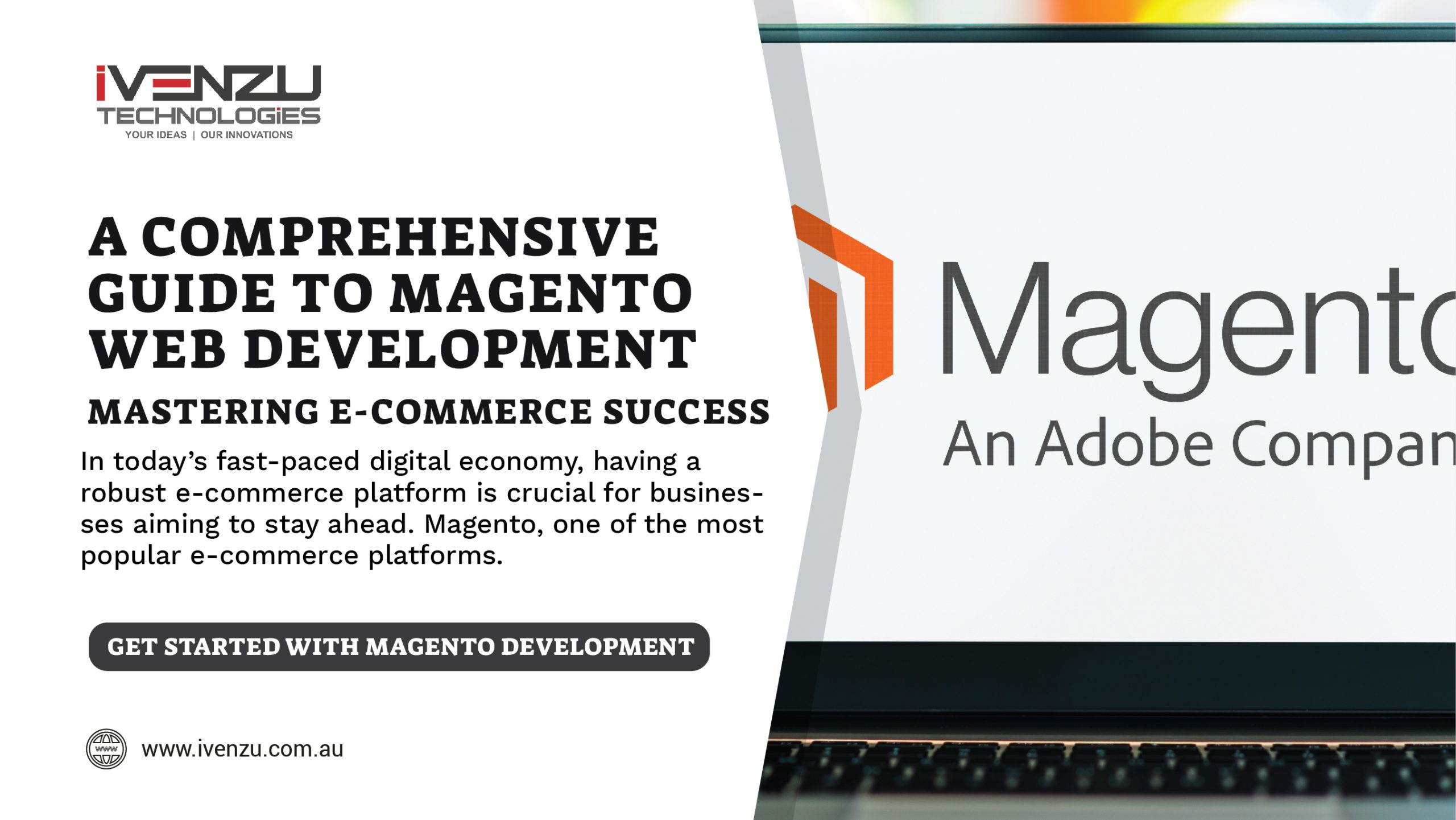A Comprehensive Guide to Magento Web Development: Mastering E-Commerce Success
In today’s fast-paced digital economy, having a robust e-commerce platform is crucial for businesses aiming to stay ahead. Magento, one of the most popular e-commerce platforms, offers unmatched flexibility, scalability, and customization options. If you’re considering Magento for your e-commerce site or looking to refine your Magento development skills, this guide will walk you through everything you need to know to succeed.

Why Choose Magento for Your E-Commerce Needs?
Magento powers over 250,000 merchants worldwide, from small startups to large enterprises, making it a trusted name in e-commerce. With features like multi-store capabilities, SEO-friendly architecture, and a wide array of extensions, Magento is the go-to solution for businesses wanting to deliver an exceptional shopping experience.
Key Benefits of Magento
-
- Scalability: Supports small stores to enterprise-level e-commerce platforms.
- Customizability: Tailor your store to match your brand and unique business requirements.
- SEO-Friendly: Built-in tools help improve visibility on search engines.
- Community Support: A vast developer community ensures continuous improvement and troubleshooting resources.
Getting Started with Magento Web Development
1. Understanding Magento Editions
Magento offers two primary editions:
-
- Magento Open Source (Community Edition): Ideal for startups or small businesses.
- Magento Commerce (Adobe Commerce): Geared towards larger enterprises with advanced features like cloud hosting, enhanced analytics, and dedicated support.
Choosing the right edition depends on your business size, goals, and budget.
2. Setting Up Your Magento Store
Before diving into development, ensure you have the necessary infrastructure:
-
- Hosting Requirements: Magento requires robust hosting due to its resource-intensive nature. Consider hosting providers like AWS, Google Cloud, or Magento-specific hosts.
- Domain and SSL: Secure your domain and integrate SSL for secure transactions.
- Install Magento: Use the Magento Setup Wizard or CLI for installation.
3. Key Features of Magento Web Development
4. Customizable Themes
Magento provides a variety of themes that can be tailored to suit your brand. Opt for responsive themes to enhance mobile user experiences, as mobile e-commerce sales make up 58% of total online revenue.
-
- Extensions and Integrations
With over 5,000 extensions available, you can add functionalities such as payment gateways, email marketing tools, and customer support features. Popular integrations include:
-
-
- PayPal and Stripe for payments.
- Mailchimp for email campaigns.
- Google Analytics for tracking.
-
-
- Product Management
Easily manage a vast inventory with features like bulk product upload, custom attributes, and pricing rules.
-
- SEO Tools
Magento’s SEO features include customizable URLs, meta tags, XML sitemaps, and schema markup support.
Advanced Magento Development Tips
1. Optimize Performance
A slow website can drive customers away. Follow these tips to improve Magento performance:
-
- Enable Caching: Use Varnish or Redis to enhance loading speeds.
- Image Optimization: Compress images without losing quality.
- Code Minification: Minimize CSS, JS, and HTML files.
2. Leverage Magento PWA Studio
Progressive Web Apps (PWA) combine the best of websites and apps. Magento’s PWA Studio lets you create a lightning-fast, app-like experience for your customers. This is crucial, as studies show that PWAs increase conversion rates by up to 36%.
3. Implement Security Best Practices
-
- Regularly update Magento to the latest version.
- Use strong admin credentials and two-factor authentication (2FA).
- Install trusted extensions and monitor them for vulnerabilities.
Your questions and answered
What is Magento web development?
Magento web development refers to building and customizing e-commerce websites using the Magento platform. It includes store setup, theme customization, extension integration, performance tuning, and more.
is Magento good for e-commerce websites?
Yes, Magento is one of the most robust and scalable e-commerce platforms, ideal for both small businesses and large enterprises. It offers powerful features, high customizability, and a strong developer community.
What are the main benefits of Magento for online stores?
Magento offers scalability, customizable themes, built-in SEO tools, advanced product management, and thousands of extensions to enhance your store’s functionality.
How much does Magento development cost?
Magento development costs vary depending on your project scope. Basic store setup may cost $2,000–$5,000, while complex, enterprise-level Magento builds can exceed $50,000.
How can I speed up my Magento website?
Use caching tools like Varnish, compress images, minimize CSS/JS, and enable Magento performance settings. Hiring an experienced developer helps with deeper optimizations.
What is Magento PWA Studio and why should I use it?
Magento PWA Studio lets you build Progressive Web Apps for your store, offering faster load times, offline functionality, and improved mobile experiences—boosting conversions by up to 36%.
More Latest Blog
In today’s digital advertising landscape, CPC (Cost-Per-Click) has become a core metric that every marketer, business owner, and advertiser must...
Quantum computing is an emerging technology that leverages the principles of quantum mechanics to solve problems practically impossible for...
With the ever-increasing reliance on technology, the role of an app developer has emerged as one of the most pivotal and sought-after positions in...
Project management is the process of planning, organising, and overseeing the completion of a project while managing resources, time, and budget to...




